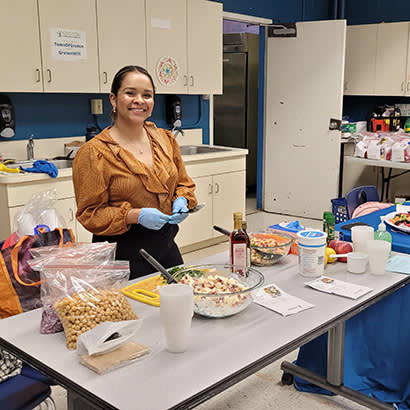
For an enhanced digital experience, read this story in the ezine.
Partnerships between public health and park and recreation agencies help advance health equity in our communities. When the Town of Groton (Connecticut) Parks and Recreation Department (Groton Parks and Recreation) was awarded a Parks as Community Wellness Hubs Grant, the department partnered with nearby public health agency Ledge Light Health District (LLHD) to create a Community Wellness Hub at the Groton Community Center (GCC). To ensure the planning process was representative of the community served, the team created equity goals using community members’ feedback.
Creating an Equity Action Plan
The team followed NRPA’s Elevating Health Equity Through Parks and Recreation: A Framework for Action while developing their Equity Action Plan. To complete the agency equity assessment, project manager and consultant Isabelle Barbour facilitated an interactive in-person workshop for Groton Parks and Recreation and LLHD team members to determine shared values and identify ways that the full team could advance diversity, equity and inclusion in the community.
The workshop was “so effective because we were able to be together in one room and really identify what our equity terms mean, find what common ground we have [and ask], ‘What are our differences?’” says LLHD Program Coordinator Veronica Mallqui, who supports nutrition education and the new food pantry at the GCC. “[I]t was also really great in creating that vulnerable space where we can really be open and share our thoughts in a room with other people who are also doing the same work.”
Community Engagement
The team created a mini survey to integrate Community Wellness Hub planning into their community engagement work. As part of this, team members met with local community groups and organizations. They also worked alongside trusted community partners, like meal provider Groton Community Meals, to engage and build rapport with community members who were not familiar with the GCC location or with center staff. This engagement made community members feel comfortable providing honest feedback about the Community Wellness Hub and what programs and services it should provide. “[T]he community engagement piece was really key and huge to developing our equity goals...and I see that as a way of not only getting information from the community but also…[creating] that welcoming space that we envision with the wellness hub,” says Mallqui.
Because the survey revealed that an estimated 75 percent of community members had never visited the community center, the team prioritized making the GCC a space where all would feel welcome to access the programs and services they desired, whether that was picking up a meal, getting a blood pressure screening, taking a cooking or language class, or utilizing another service. “We have our own ideas of what people want, but really want those answers to come from the community,” says Ben Morse, manager of recreation services at Groton Parks and Recreation.
Establishing Equity Goals
Community members identified the need for increased access to swimming lessons in the mini survey. Barbour says, “[T]he ability of people to access swimming pools has run along racial lines for a long time and to a certain extent, continues to do so.”
“We’re a shoreline town, so the safety aspect of swimming is huge where we are, and there [are] barely any offerings of swim lessons.... [W]e recognize that we need to make lessons affordable for everyone to be able to participate,” says Morse.
Using the feedback, the team developed four equity goals to pursue during the 18-month grant period:
- Facilitate or participate in ongoing community engagement activities that provide focus and direction for policies, programs, services and evaluation. The data will fuel a continuous process improvement initiative focused on forwarding racial equity.
- Create written partnership agreements with three community-serving organizations that can support one or more of the seven dimensions of well-being.
- Utilize information gleaned from community engagement work to expand and/or tailor food and/or meal offerings in the community.
- Increase access for non-swimmers to swimming lessons in the community.
Forming Partnerships
When seeking to advance health equity, park and recreation professionals “should reach out to their local public health departments. There’s local expertise in communities that can help and often have people that are eager to help and can provide services,” says Barbour. “You want to have those connections to your community before you need them.”
Morse says, “[A]s a park and recreation department, we know how to program, we know how to run events, but we don’t necessarily know the other aspects of food insecurity or how to run flu clinics or COVID-19 testing. All these different things go into a wellness hub. You need that partnership with the health department and the resources that come with it.”
Alexandra Reynolds is Associate Editor of Parks & Recreation magazine. Maureen Neumann is Senior Program Manager at NRPA.


